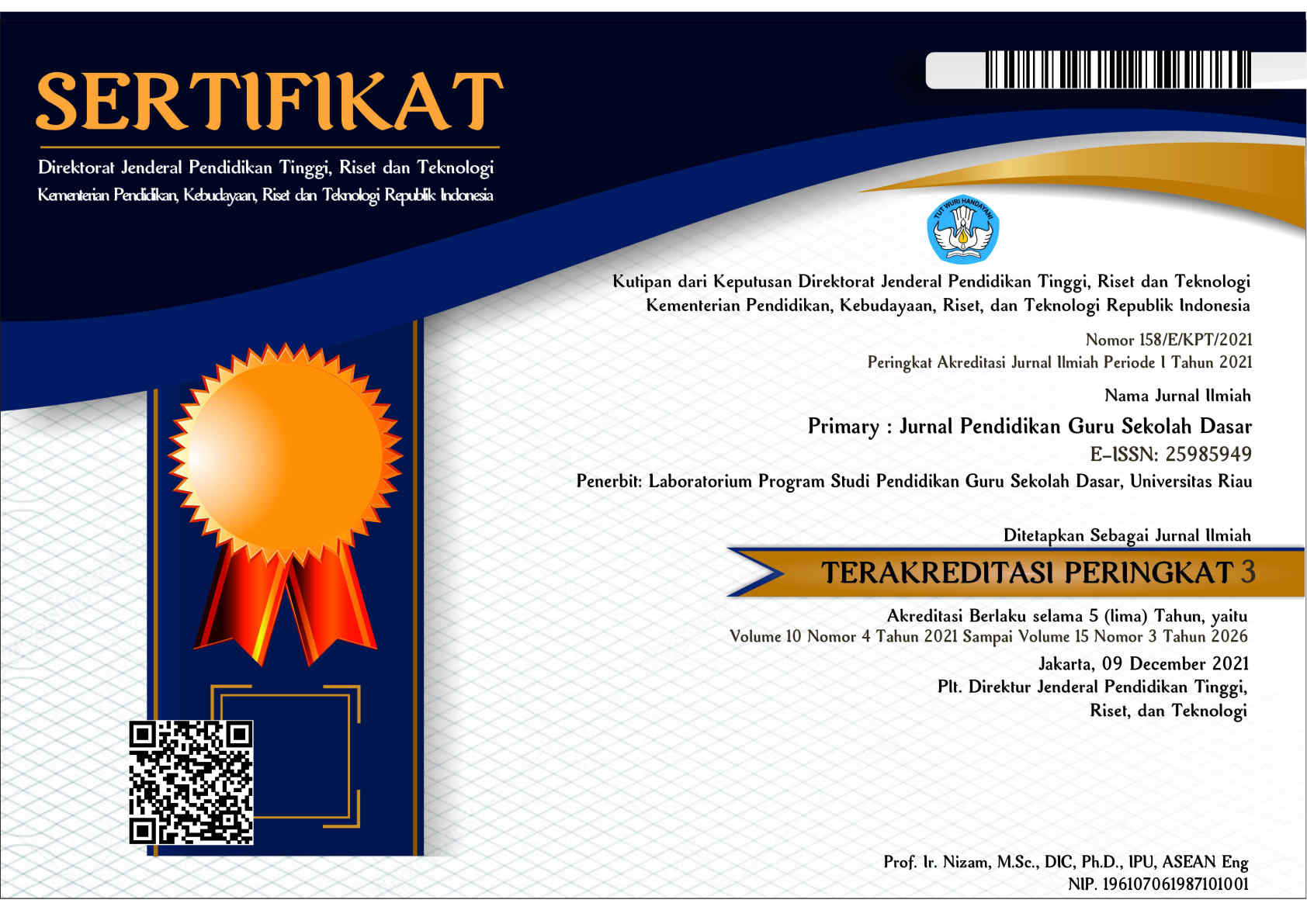MODEL PEMBELAJARAN KOOPERATIF LEARNING TIPE COMPLETE SENTENCE TERHADAP KOGNITIF SISWA PADA MATA PELAJARAN IPS KELAS V SEKOLAH DASAR
Abstract
The background of this study was the students’ less adequate cognitive abilities.. This study was a quantitative research on the students’ cognitive abilitiesat garde V SDN Kebaharan 1 Kota Serang in the odd semester of the academic year 2020/2021. The methodof this study was a nonequivalent control group design, on the complete sentence learning model. The purpose of this study was to determine the differences of the students’ cognitive learning outcomes after implementing the complete sentence learning model in social science (IPS) subject for grade V. The material was about theme 1: animals and humans organs of motion, subtheme 3: the environment and its benefits, learning 4 at SDN Kebaharan 1 Serang City. The method of this study was a quasi-experimental method with a nonequivalent control group design. The sampling technique was carried out by using a purposive sampling technique. The samples were 30 students at VA class as the control class and 30 students at VB as the experimental class. The results of the data calculation obtained from the students’ post-test, it was found that the students in the experimental class and the control class possessed different cognitive abilities. The average test score for the experimental class was 79.7 and the average test score for the control class was 71.9. From this result, it can be concluded that complete sentence model is better than the concept sentence model because the complete sentence model involves students in groups to discuss the right key answer to complete the incomplete paragraphs. The results and discussion of this study revealed that the complete sentence learning model can be used for social science learning since it can increase students' cognitive abilities in a social science subject.
Keywords
Full Text:
PDF (Bahasa Indonesia)References
Arikunto. (2012). Prosedur Penelitian Suatu Pendekatan Praktik. Jakarta: PT. Rineka Cipta.
Arifin. (2013). Evaluasi Pembelajaran, Bandung: PT. Remaja Rosdakarya.
Gunawan, R. (2013). Pendidikan IPS Filosofi, Konsep, dan Aplikasi. Bandung: Alfabeta.
Hasan, H. (2009). Pembelajaran Pendidikan IPS di Sekolah Dasar. Tersedia: http://www.pembelajaran.wordpress.com/ (diakses tanggal 25 desember 2019).
Hidayati, dkk. (2008). Pengembangan Pendidikan IPS SD. (Jakarta : Direktorat Jenderal Pendidikan Tinggi Departemen Pendidikan Nasional).
Huda, M. (2014). Model-Model Pengajaran dan Pembelajaran. Yogyakarta: Pustaka Pelajar.
Jamal. (2016). Tips Efektif Cooperative Learning. Yogyakarta: Diva Press.
Jannah, M. (2010). Metode Penelitian Kuantitatif. Jakarta: Rajawali Pers.
Kagan. (2004). Pembelajaran Pendidikan IPS di Sekolah Dasar. Tersedia: http://www.pembelajaran.wordpress.com/ (diakses tanggal 25 desember 2019).
Riduwan. (2010). Skala Pengukuran Variabel-variabel Penelitian. (Bandung : Alfabeta).
Rusman. (2011). Model Pembelajaran Make A Match Untuk Pembelajaran IPA yang Menyenangkan, tersedia: https://jurnal.utsjogja.ac.id/. (diakses pada tanggal 4 desember 2019).
Sanjaya Wina. (2016). Strategi Pembelajaran Berorientasi Standar Proses Pendidikan, (Jakarta: Kencana).
Suprijono, A. (2016). Cooperative Learning Teori dan Aplikasi PAIKEM. Yogyakarta: Pustaka Pelajar.
Soemantri. (2004). Pembelajaran Pendidikan IPS di Sekolah Dasar. Tersedia: http://www.pembelajaran.wordpress.com/ (diakses tanggal 25 desember 2019).
Sugiyono. (2011). Metode Penelitian Kuantitatif, Kualitatif, dan R&D, Bandung: Alfabeta.
Sugiyono. (2014). Metode Penelitian Pendidikan Kuantitatif, Kualitatif dan R&D. Bandung: Alfabeta.
Shoimin, A. (2014). 68 Model Pembelajaran Inovatif Dalam Kurikulum 2013. Yogyakarta: Ar-Ruzzz Media.
Trianto. (2012). Model Pembelajaran Terpadu, Konsep, Strategi, dan Implementasinya Dalam Kurikulum Tingkat Satuan Pendidikan (KTSP). Jakarta: PT. Bumi Aksara.
DOI: http://dx.doi.org/10.33578/jpfkip.v9i5.8040
Refbacks
- There are currently no refbacks.
Copyright (c) 2020 Suparno Suparno, M. Taufik

This work is licensed under a Creative Commons Attribution-NonCommercial-ShareAlike 4.0 International License.
____________________________________________________________
Primary: Jurnal Pendidikan Guru Sekolah Dasar
Secretariat
Program Studi Pendidikan Guru Sekolah Dasar
Gedung B1, FKIP Universitas Riau
Kampus Bina Widya Km. 12,5 Simpang Baru Panam
Pekanbaru Riau Indonesia 28293
e-mail : primary@ejournal.unri.ac.id



